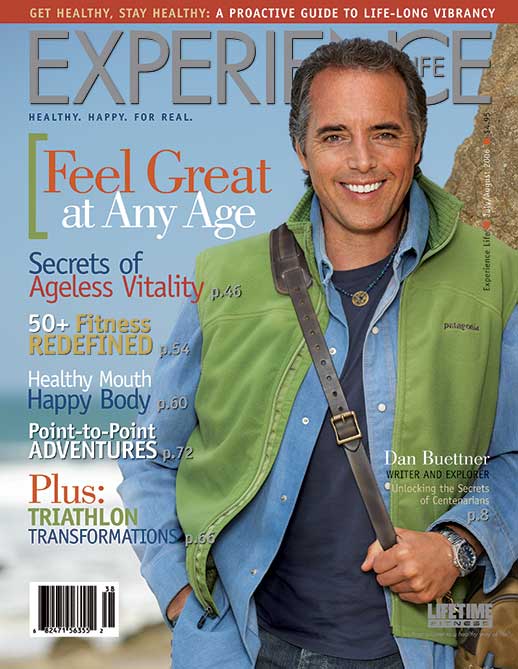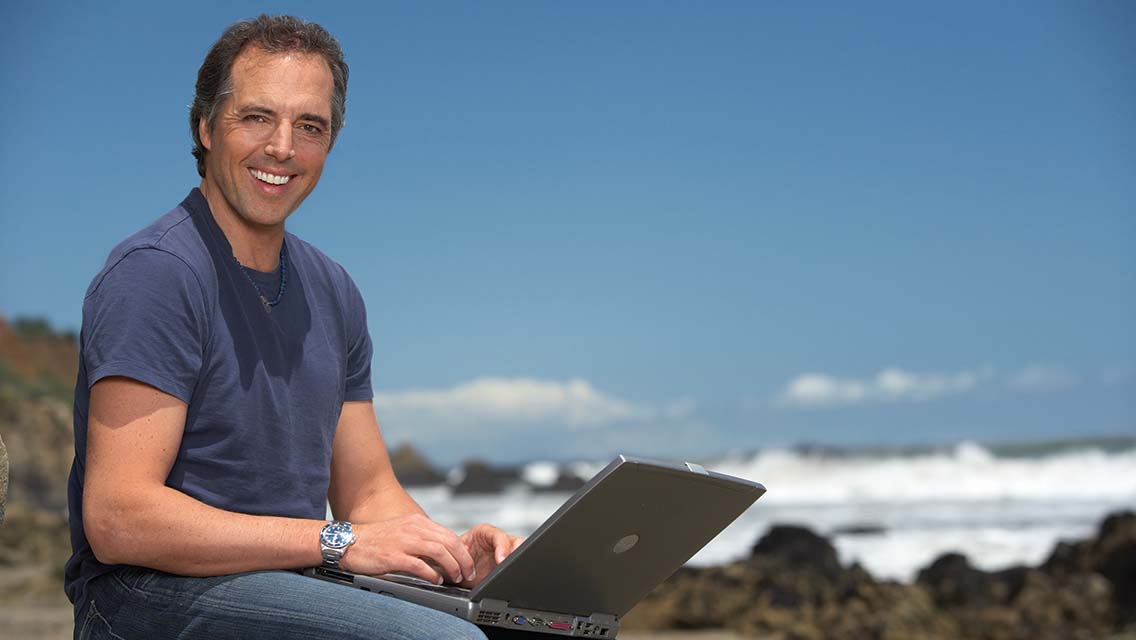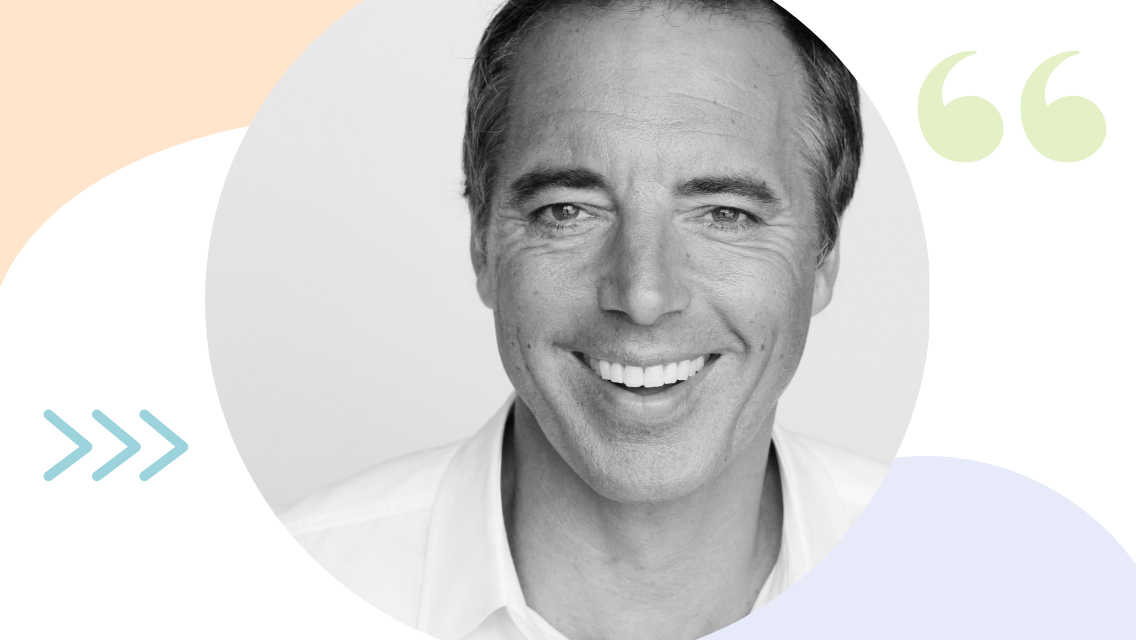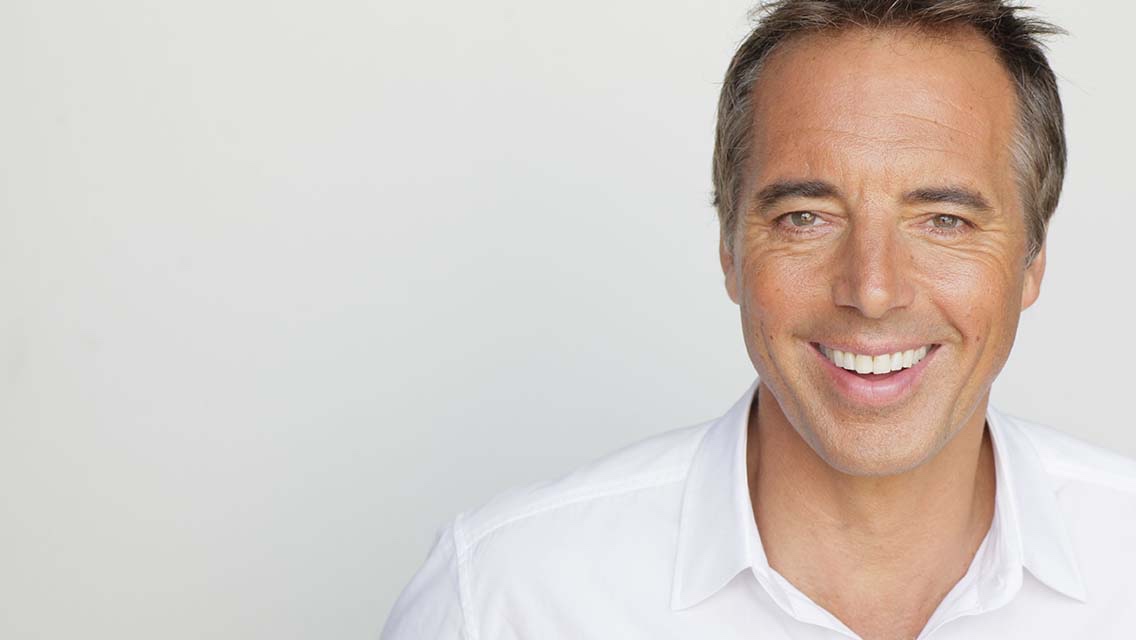Dan Buettner can trace his appetite for adventure back to his childhood. “My father loved the outdoors. When other kids were vacationing in Disney World, we were paddling dozens of miles into the Boundary Waters,” he recalls. As a teenager, he satisfied his wanderlust selling enough Minneapolis Star and Tribune newspaper subscriptions to win trips to destinations as far-flung as Hawaii, the Virgin Islands and Spain. “It was on one of those trips when I was about 17 that I had this really clear epiphany that travel was what I wanted to do, and that I wanted to explore for a living,” he says.
Today, Buettner travels the world as both a passion and a profession – and as a pioneer in the study of long-term human health and vitality.
 It’s not every paperboy who can parlay his sales into all-expense-paid vacations around the world, but there’s nothing typical about Buettner. At 46, the St. Paul, Minn.–based explorer radiates boundless vitality and charisma (traits that surely appeal to long-time significant other, fashion model and American icon Cheryl Tiegs) – and the kind of no-challenge-is-too-great sensibility that generates world records. Buettner holds three for long-distance cycling: 15,500 miles from the Arctic Circle to Tierra del Fuego, the archipelago at the southernmost tip of South America, in ’86–’87; 12,888 miles around the width of the world in ’90; and 12,172 miles down the length of Africa in ’92–’93, an expedition he documented in an Emmy Award–winning PBS feature.
It’s not every paperboy who can parlay his sales into all-expense-paid vacations around the world, but there’s nothing typical about Buettner. At 46, the St. Paul, Minn.–based explorer radiates boundless vitality and charisma (traits that surely appeal to long-time significant other, fashion model and American icon Cheryl Tiegs) – and the kind of no-challenge-is-too-great sensibility that generates world records. Buettner holds three for long-distance cycling: 15,500 miles from the Arctic Circle to Tierra del Fuego, the archipelago at the southernmost tip of South America, in ’86–’87; 12,888 miles around the width of the world in ’90; and 12,172 miles down the length of Africa in ’92–’93, an expedition he documented in an Emmy Award–winning PBS feature.
But for Buettner, record-breaking is a flash in the pan compared with the breadth of what travel has to teach. To share those lessons, he’s pioneered an adventure-education method he calls the “Quest Model,” which brings together (with the help of the Internet) a team of experts, an ancient mystery and a gaggle of school children across the world. As he explains, “the Quest Model lets an online audience direct a team of experts to solve a mystery.” For example, during MayaQuest, the first Quest-based trip of its kind, 1.3 million school children, with expert guidance, interactively explored regions of the world – from the Galapagos Islands to Central Asia – to unearth answers to the mysterious collapse of the Classic Maya civilization. To date, he’s led teams of researchers, doctors and scientists on 15 such Quest expeditions.
It was in 2002 that Buettner shifted his attention from solving historical riddles to plumbing the time-tested wisdom of indigenous cultures. “On all of these Quests, I was talking to modern indigenous peoples – interviewing the contemporary Maya for MayaQuest to find out their take on why the c lassic civilization fell or consulting Australian aborigines for AustraliaQuest to gain insight on how they’ve managed to survive over so many millennia,” he explains. “And invariably you see this incredible wealth of wisdom and observe human history embedded in their cultural habits and oral traditions.”
It dawned on Buettner that if he could isolate the places where people were living the longest and healthiest lives, he could cull a healthy longevity formula, a kind of “recipe for wellness,” from their practices. A study of Danish twins, he explains, has shown that up to 75 percent of how long we live is dictated by our lifestyle. “If we can identify, with certainty, the cultures who are living longer, and then scientifically distill their lifestyle,” says Buettner, “it yields a de facto formula for longevity.”
Buettner believes that unraveling the secrets of healthy longevity is key to overcoming some of the most pressing challenges facing our society. “On the track we’re on, we’re going to bust our current healthcare system,” he explains. “Life expectancy in America could actually drop; for the first time in modern history, our children are likely to live shorter lives than we do. The culprits: childhood obesity and the diseases that manifest in middle age.”
That’s why Buettner has made educating kids such an essential component of his search for longevity, a project he’s calling Blue Zones, which refer to the world’s hot spots where people live longer and better. “You can benefit from this no matter how old you are,” he says, “but it’s easier to make a big change, or a change that might yield more dividends, when you’re young.
“Many lifestyle habits are solidified between the ages of 8 and 14, which is why tweeners are the Holy Grail for advertisers,” he continues. “Pick a brand when you’re young, and you’ll likely use it for life. The same phenomenon applies to what you eat for dinner, or your patterns of TV watching versus exercising. Moreover, there are several recent studies that show that if you’re obese by the age of 11, it’s very difficult to reverse that. If we’re really going to set out to accomplish our mission – helping people live longer and live better – the most responsible place for us to start is with kids.”
Buettner has developed a health-education curriculum for students, the Blue Zones Challenge (provided free to schools nationwide by Blue Zones sponsors Allianz Life and Davisco). “We’ve teamed with the world’s foremost childhood obesity expert, Dr. Cheryl Perry, to identify the four simplest and most powerful behaviors kids can employ to make sure they grow up healthy,” says Buettner. “They are: Eat more fruits and vegetables, get more physical activity, drink fewer sweetened drinks, and watch less TV. The Challenge teams the kids with their teachers and parents for a four-week pledge, the details of which are decided by the child. The kids sign a contract, and they can compare their progress with other kids around the country. Our pilot study of the Challenge showed an 80 percent behavior improvement in all four of the areas.”
Buettner’s two younger children, ages 8 and 11, will be participating in a Blue Zones Challenge through their school in the coming year. His eldest, a 19-year-old college sophomore, is already lobbying to join the next Blue Zones Quest. “I told him he has to finish school, and then we’ll talk,” Buettner relays proudly.
As for his own lifestyle habits, Buettner doesn’t find it difficult to employ his Blue Zones findings. As he explains, “The same behaviors that yield a longer life yield a richer life. ” His team has isolated 18 behaviors that will add quality and more rewarding years to your life. He ticks them off. One of the first on his list: regular low-intensity exercise. “Long daily walks are an optimal choice. They might seem boring and easy, but they’re a terrific form of physical activity. Playing with your kids, that’s arguably some of the best exercise you can get, because it accomplishes three goals at once: You’re relieving stress, you’re getting that low-intensity activity, and you’re investing in your family. It sounds trite and clichéd, but it’s been measured scientifically: Family time can add two or three years to your life. Gardening is another interesting revelation. Here’s a source of not only fruits and veggies, but daily low impact physical activity plus stress relief,” he adds. Buettner satisfies his low-intensity-exercise quota by hitting the yoga studio three times a week and regularly commuting by bike.
And what does the longevity expert most look forward to in his golden years? “Before I started this work, I wasn’t much interested in being an old person,” he admits. “But meeting these incredible seniors has changed my perspective. It makes me look forward to the years when I’ll have the accumulated wisdom, the wits about me and a group of good friends to celebrate a life well-lived.”





This Post Has 0 Comments